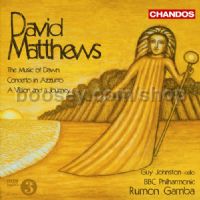Orch Works (Chandos Audio CD)
Orch Works (Chandos Audio CD)
* Estimated price converted from UK retail price
‘The reputation of David Matthews has risen steadily over the last few years… among his contemporaries he has few rivals in the creating and sustaining of larger forms.’ International Record Review
Born in 1943 in London, Matthews was first attracted to the idea of becoming a composer only in his teens, and initially was self-taught. After university, he had formal lessons with Anthony Milner, and worked in Aldeburgh as Benjamin Britten’s assistant. His music represents a continuation of, rather than a challenge to, the great tradition of British music in the twentieth century placing a strong emphasis on melodic lines and on what has been called ‘a Romantic generosity of expression.’ At the same time, it is by no means straightforwardly conservative; it speaks in a highly individual voice; and one that is still evolving. The Times wrote recently ‘Matthews is among our most conspicuous symphonists, as well as among our stalwart adherents of tonality.’ Chandos adds this very-English composer to the bastion of English composers already represented on the label.
The BBC Philharmonic and Rumon Gamba showcase three of his symphonic poems: The Music of Dawn, A Vision and a Journey, and the cello concerto, Concerto in Azzuro, performed by Musician of the Year award winner, Guy Johnston. All receive their premiere recording.
The Music of Dawn was inspired by the painting, of the same name, by British artist, Cecil Collins and used as the artwork this release. Matthews recalls, ‘I regard him as one of the most important painters of the twentieth century. I was particularly struck by the painting called ‘The Music of Dawn’. It immediately suggested music as, from its title it was obviously intended to do. Cecil Collins was the most musical of painters, and I hope that he would have liked the idea of his painting being evoked in the medium of orchestral sound.’ Richly scored for large orchestra the work is an evocation of the sun, beginning in the pale light of early dawn, and ending in the blaze of noon. The majority of the work was composed at Norman Del Mar’s house in Cornwall.
Both A Vision and a Journey and Concerto in Azzurro were commissioned by the BBC. The ‘symphonic fantasia’ A Vision and a Journey was first performed by the BBC Philharmonic in 1993. Concerto in Azzurro is composed as a single large-scale movement, lasting just under 25 minutes. It derives from the first movement of Bruckner’s Ninth Symphony and a holiday spent on the Island of Lundy, and a vision of blueness found there.
Peter Marchbank of the Guardian wrote recently of David Matthews, ‘The lyricism shines out and one is instantly aware that this is music by a composer who is very much a part of the great English tradition.’




